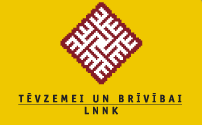
Instituting all-Latvian language education is a perennial issue for the For Fatherland and Freedom Party.
RIGA — The nationalist party For Fatherland and Freedom has said it would begin gathering signatures for a constitutional amendment mandating that all state-sponsored education be in the Latvian language.
Lawmaker and party member Dzintars Rasnačs told the Latvijas Avize daily newspaper that the proposed amendment to Article 112 in the Satversme is simple and will include a phrase that free primary and secondary education in Latvia will be provided “in the national language.”
He said the party’s board has not decided on a specific action plan but that in all likelihood it would begin gathering 10,000 signatures of registered voters over the next month.
If they succeed — and there is little reason to think they won’t — the legislation will be included in the parliamentary agenda. However, the paper speculates that since it is unlikely that the necessary signatures will be collected prior to elections this October, the amendment will go to the next Saeima.
For Fatherland and Freedom have traditionally clung to language and education as bread-and-butter issues, and there is little doubt that the party, which risks being sidelined due to its low popularity, is timing this proposal to coincide with the October elections.
Rasnačs, a former justice minister, first spoke about the legislative initiative in December and even handed it to education and science minister Tatjana Koķe. According to Latvijas Avize, the minister, who belongs to the Greens and Farmers Union, was “diplomatically cautious” about the proposal, saying that this was a question for the distant future and that a discussion should begin.
Given the lack of enthusiasm for politicians to seize contentious issues such as language and education during the current economic crisis, the proposal seems likely to fail even if the signatures are gathered. Furthermore, if pundits are correct and parties representing Russian-speaking minorities are heavily represented in the next Saeima, the amendment proposal will go nowhere.
But the nationalists apparently feel they must try. After this year’s split in the party, For Fatherland and Freedom has only five members in the current parliament, the minimum needed for representation, and is desperate for survival. According to a Latvijas Fakti opinion poll for November, the party would receive only 2.4 percent of the vote if elections had been held that month — putting it in eighth place among current parties and worse, below the 5 percent barrier.













What can you say… The minds of these people (to whom I belonged 20 years ago) work in the old Soviet pattern, which is basically: force and humiliate. It would only create bitterness and resentment in those Russian speakers who would be subject to such regulations. But it rather seems apparent that they will never be enacted. Instead of dreaming, you guys should better contemplate the economic mess you are responsible for as part of the ruling coalition…
Well, I do not know how would local Russians think about that. As an idea it is good in fact. Now, if everyone has possibility to learn the language, people cannot complain of not getting similar rights or difficulties of getting citizenship because of language tests.
This is the point of it. Getting some rights means also need to do something for it. Nothing is free in this life, dear friends.
Easier is to start complaining and searching for negative effects but to be honest, this is not a bad idea at all. Need to think positive and take a chance if someone offers.
It is unbelievable that this is not the law now!
If you can not preserve the language you have no culture and no identity .Latvians do not have the luxury of numbers to be generous.
Talk to the French, and get some sense.
I agree with ‘Lime’. All sovereign countries should mandate that residents or migrants learn to speak and read in the native language in order to preserve the country’s cultural heritage. Otherwise Latvians will lose their ancient ethnicity and their wealth of folklore songs and literature which is already happening in some small enclaves of Latvia. Those who wish to learn other languages and culture should also be given that opportunity in extra school or higher education curricula. Under russian occupation latvia’s ancient folkdancing styles and symbolism, related to life and respect for the earth, was polluted by communist aethiasm. Taking a politically expedient view to purely preserve one’s political survival shows the disingenousness of some of those in power and their lack of moral fiber and allegiance to Latvia’s traditional values as symbolised in the words of Latvia’s national anthem.